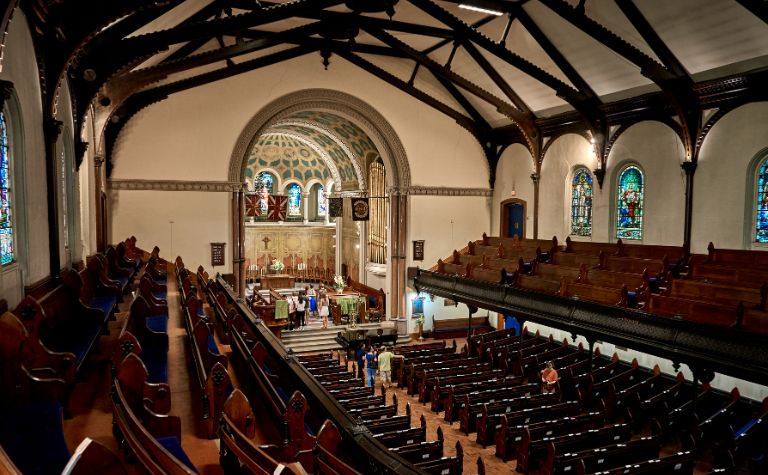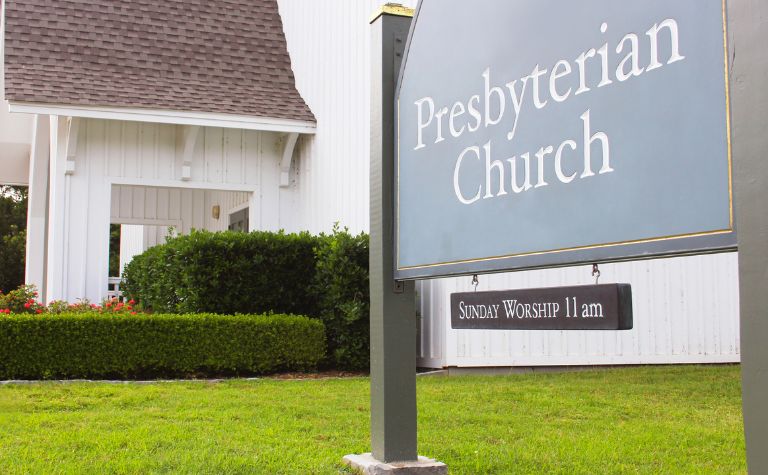Presbyterians are members of a Protestant Christian denomination rooted in Reformed theology. But what precisely do Presbyterians believe, and how do these beliefs influence their faith practices?
Presbyterians follow a hierarchical church structure (Presbyterian polity), believe in predestination, and use Covenant Theology to interpret the Bible. They practice two sacraments—baptism and the Lord’s Supper—and uphold confessions as detailed expressions of their faith.
How is Presbyterian Polity different than other forms of church governance? What is predestination, and how do other theologies differ from it? What’s the difference between Covenant and Dispensational theology? Why are sacraments important to the tradition? What does being “confessional” mean? Keep reading to learn answers to these questions and others.
Also, compare Presbyterianism with other churches on the Christian Denominations Comparison Chart.

Presbyterian Polity
Presbyterians are distinctive in their system of church governance, known as Presbyterian polity. It involves a hierarchy of councils or assemblies known as “presbyteries,” composed of elders elected by individual congregations. Decisions about doctrine, church management, and other matters are made at various levels of these presbyteries.
| Presbyterian Polity | Congregational Polity | |
|---|---|---|
| Governance Structure | Presbyterian polity is characterized by a hierarchical structure composed of a series of councils or presbyteries, which include the session (local congregation level), presbytery (local area), synod (regional), and general assembly (national/international). | Congregational polity, as the name implies, puts the highest level of decision-making authority in the hands of the local congregation. There is no higher church authority that can overrule a local congregation’s decisions. |
| Leadership | The leadership in Presbyterian polity consists of elders (both teaching and ruling elders), who are elected by the congregation and sit on the session, the governing body at the local level. | The leadership in congregational polity is usually composed of a pastor and possibly deacons or a church board, all selected by the congregation. The leadership carries out the decisions made by the congregation but does not have autonomous decision-making authority. |
| Decision Making | Decisions are made at different levels of the church’s councils, with some decisions reserved for higher councils like the synod or general assembly. All churches within the denomination are bound by these decisions. | Decisions, including the selection of leaders, the budget, and doctrinal issues, are made by the local congregation, typically through a vote among members. No decision can be imposed on the local congregation by a higher ecclesiastical authority. |
| Inter-Church Relationships | Presbyterian churches are interconnected and accountable to each other through the presbyteries, synods, and general assembly. These bodies can provide support and intervention if needed. | Congregational churches are independent, though they may choose to associate with other churches for mutual support and shared missions. However, these associations do not have authority over the local church’s governance. |
Also, compare Presbyterianism vs. Roman Catholicism: Differences to learn more.

Predestination Is Important to Presbyterianism
Many Presbyterians adhere to the Calvinist doctrine of predestination, which holds that God has foreordained all events, including who will be saved. This belief stems from the theological emphasis on the sovereignty of God.
Predestination, particularly as articulated in Reformed theology, can be contrasted with the doctrine of free will or Arminianism.
| Predestination | Free Will | |
|---|---|---|
| Key Belief | God, in His sovereignty, has predestined certain individuals to salvation before the foundation of the world. | God, in His love and justice, has given humans the free will to choose or reject Him. Salvation is offered to all but must be accepted by the individual. |
| Divine Sovereignty and Human Freedom | Divine sovereignty is emphasized. Human free will is seen as limited or bound by our sinful nature. | A balance between divine sovereignty and human free will is maintained. Humans have genuine freedom to respond to God’s grace. |
| Grace | Grace is irresistible – those whom God has chosen cannot ultimately resist His call to salvation. | Grace is resistible – individuals can resist God’s call to salvation and choose to reject Him. |
| Atonement | Limited atonement – Christ’s death is seen as effectively securing salvation for the elect. | Unlimited atonement – Christ’s death is seen as making salvation possible for all but effective only for those who choose to accept it. |
| Security of Salvation | Perseverance of the saints – those who are truly saved will continue in faith and cannot lose their salvation. | Conditional security – it is possible for a believer to fall from grace if they turn away from Christ. |
Presbyterians Value Covenant Theology
Presbyterians traditionally hold to Covenant Theology, seeing the history of God’s dealings with humanity as a series of covenants (agreements) revealed in the Bible. Key among these is the covenant of works, made with Adam, and the covenant of grace, made with all believers in Jesus Christ.
| Covenant Theology | Dispensationalism | |
|---|---|---|
| Main Concept | God interacts with humanity through covenants (agreements) which are unified and continuous throughout the Bible. | God interacts with humanity through different dispensations (periods of time) in which God’s requirements may change. |
| Biblical Interpretation | Emphasizes the unity and continuity of the covenant of grace throughout the Old and New Testaments. | Emphasizes the distinctions between different dispensations in the Bible, particularly between the Old and New Testaments. |
| Israel and the Church | The church is seen as the continuation of Israel – the one people of God. The promises made to Israel are fulfilled in the church. | Israel and the church are distinct entities, each with different promises. God has a separate plan for ethnic Israel. |
| End Times (Eschatology) | May hold various views, but often amillennial or postmillennial, seeing the current church age as the fulfillment of many Old Testament prophecies. | Typically premillennial, with a belief in a future literal thousand-year reign of Christ on earth. Also, often holds to a pre-tribulation rapture of the church. |
| Key Covenants | Often highlights covenants of works (with Adam), grace (with Christ), and sometimes redemption. Also sees the covenants with Noah, Abraham, Moses, and David as administrations of the covenant of grace. | Focus is not on covenants but dispensations, such as Innocence (before the Fall), Conscience (from the Fall to Noah), Human Government (Noah to Abraham), Promise (Abraham to Moses), Law (Moses to Christ), Grace (the Church Age), and the Millennial Kingdom. |
Also, compare Presbyterianism vs. Baptist: Differences to learn more.

What Sacraments Do Presbyterians Practice?
Presbyterians, like many other Christian denominations, recognize two sacraments: baptism and the Lord’s Supper (or Communion). They believe that these sacraments are signs and seals of God’s covenant of grace.
| Presbyterian View | Baptist View | |
|---|---|---|
| Baptism | Infants are baptized as a sign and seal of God’s covenant with believers and their children. Adult converts are also baptized if they were not previously baptized. | Only believers are baptized; hence, the term “believer’s baptism.” Infants are not baptized because they believe baptism follows a personal profession of faith. |
| Baptismal Mode | Baptism can be performed by sprinkling, pouring, or immersion. The mode is not as important as the reality it signifies, which is the cleansing of sin and incorporation into the covenant community. | Baptism is generally performed by immersion, symbolizing the believer’s identification with the death, burial, and resurrection of Jesus. |
| The Lord’s Supper | The Lord’s Supper is a means of grace through which the participant spiritually feeds on Christ by faith. It’s not merely a memorial but a time when Christ is spiritually present. | The Lord’s Supper is typically viewed as a memorial, a time to remember Christ’s death and resurrection. It is not seen as a means of grace in the same way as in Presbyterian theology. |
| Frequency of the Lord’s Supper | The frequency varies by church but can be weekly, monthly, or quarterly. The New Testament does not prescribe a specific frequency. | The frequency also varies among Baptist churches, often observed monthly or quarterly. |
Confessional Tradition
Presbyterians belong to a confessional tradition, which means they have detailed statements of faith, known as “confessions,” that outline their theological beliefs. A key document for many Presbyterians is the Westminster Confession of Faith.
| Confessional Tradition | Non-Confessional | |
|---|---|---|
| Doctrinal Statements | Presbyterians use detailed statements of faith, or confessions, such as the Westminster Confession of Faith, to articulate their beliefs and doctrines. | Non-confessional traditions do not use formal confessions or creeds to define their faith. They may have a statement of faith or basic beliefs, but these are usually simpler and less detailed. |
| Use of Creeds | Creeds and confessions play a substantial role in worship, teaching, and determining orthodoxy. They help in providing a systematic understanding of biblical teachings. | Creeds and confessions are usually not used in worship or teaching. The focus is primarily on the Bible itself rather than systematic summaries of its teachings. |
| Authority of Creeds | While the Bible is the ultimate authority, creeds and confessions are seen as authoritative summaries of biblical doctrine that the church has recognized over time. They help to guide the interpretation of the Bible. | The Bible is seen as the only authority. While past interpretations may be respected, they are not given the same level of authority as the Bible itself. |
| Typical Examples | Besides Presbyterianism, other confessional traditions include Lutheranism, Anglicanism, and some forms of Reformed theology. | Examples of non-confessional or non-creedal traditions include many Baptists, Pentecostals, Quakers, and Churches of Christ. |
Also, compare Presbyterianism vs. Episcopalian: Differences to learn more.
Related Questions
The Presbyterian and Baptist traditions are influential Protestant denominations that have left their mark in Europe, America, and worldwide. The traditions agree on many important matters of faith...
The Roman Catholic and Presbyterian branches of the Christian faith trace their origins to Jesus of Nazareth and his apostles, as well as their writings that comprise most of the New Testament. There...
